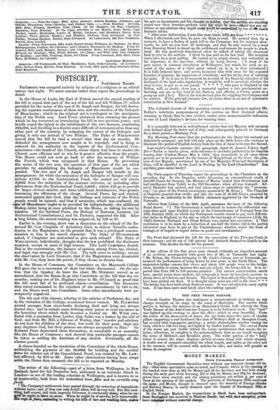POSTSCRIPT.
SATURDAY NIGHT.
Parliament was occupied entirely by subjects of a religious or an ethical nature last night. We must narrate rather than report the proceedings in detail.
In the House of Lords, the Earl of Powis moved the second reading of :his bill to repeal that part of the act of the 5th and Gth William IV. which provided for the union of the sees of St. Asaph and Bangor; his bill decree- ing the separate continuance of those sees, and the erection of the bishopric Of Manchester; which in the original act is contingent on the amalgama- tionof the Welch sees. Lord Powis abstained from retracing the ground which he has traversed on introducing his bill in two previous years; and briefly urged the injury to the inhabitants of the two dioceses, numbering 396,000, and dwelling in a district more difficult of communication than any other part of the country, by enlarging the extent of the bishopric and giving it only one instead of two Bishops. The Duke of WELLINGTON moved that the bill be read a second time that day six months. He defended the arrangement now sought to be repealed; and in doing so referred for his authority to the reports of the Ecclesiastical Corn- .missioners—the heads of the Church, whose object had been to render the ,Church more efficient and to win for it greater affection from the people. The House could not now go back to alter the measure of William the Fourth, which was unopposed in that House. By preventing the union of the two sees, the operation of that part of the act which provides for establishing the bishopric of Manchester would be sus- pended. - The two sees of St. Asaph and Bangor will benefit by the :arrangement: for while the extinction of the bishopric of Bangor will con- ?tribute .4,7501. to the . Ecclesiastical Fund, the united see will obtain 3,9001. from the extinction of the sinecure rectories, or, including other Allowances from the Ecclesiastkal Fund, 5,0001.; which will go to provide for larger clerical salaries and three additional :Archdeacons, thus greatly increasing the efficiently of the clergy. _ Several. Peers, lay and clerical, contended against this view,..that the feelings and interests of the Welch people would be injured; and that if necessary, which was confessed, the *wee-of ,Manehester ought to be prorided for independently; the additional Ilisaop either being at once admitted to the House, or taking his seat by' -rotation. Of the Spiritual Peers, the Bishops of BANGOR, LONDON' (an Ecclesiastical Commissioner,) and ST. DA'rw's, supported the bill. After AI long debate; the second reading was negatived, by 129 to 97.
Earlier in the evening, there was a discussion on the refusal of the Re- .rerend Mr. Cox, Chaplain of Aylesbury Gaol, to deliver Tawell's confes- ,fession to the Magistrates, on the ground that it was a privileged commu- nication to him in his sacred character. The Duke of BUCKINGHAM asked, if Chaplains are authorized to give such refusal? The Duke of WELLINGTON, individually, thought that the law prohibited the disclosure required, except in cases of high treason. This Lord CAMPBELL denied. .But in the conversation, the balance of opinion, among Peers lay, clerical, and legal, was strongly with Mr. Cox. The talk came to nothing; except the observation by Lord 'STANLEY, that if the Magistrates were di;satisfied with Mr. Cox, they have the power, if they choose, to dismiss him.
In the House of Commons, the Committee on the Maynooth College Bill gave rise to a succession of short but bitter discussions. On the mo- Aion that the Speaker do leave the chair, Mr. MEDLEY moved as an -amendment, that the House do go into Committee on the bill that day six -months; making use of Dr. Higgins's letter to Mr. O'Connell as proof that the bill must fail of its professed object—conciliation. The discussion thus raised terminated in the rejection of the amendment, by 160 to 52; and the House went into Committee. Some other amendments were pe- remptorily negatived.
The 4th and 17th clauses, relating to the salaries of Professors, &c., and -to the visitation of the College, occasioned fiercer contest. Mr. PLUMPTRE '‘q-noted passages from class-books declaring theft and lying not always mortal sins; and in certain cases defining sixty pence or even ten pence as the boundary above which theft becomes a mortal sin. Mr. WYSE reta- liated with a quotation from Luther, that Judas was a traitor by the will of God; and from Mr. Hill, a follower of Wesley, that "murder and adultery do not hurt the children of the elect, but work for their good: their sins may displease God, but their persons are always acceptable to Him." Sir ROBERT PEEL deprecated these discussions, as unsuitable to an assembly like the House of Commons; and showed that particular passages cannot be taken as settling the doctrines of any church. Eventually, all the clauses passed.
A clause founded on the resolution of the Committee of the whole House, authorizing the payment of the 30,0001. for building and the needful sums for salaries out of the Consolidated Fund, was resisted by Mr. Law; but affirmed, by 210 to 88. Some other obstructions having been swept aside, the House then resumed; the bill to be reported on Monday.


























 Previous page
Previous page